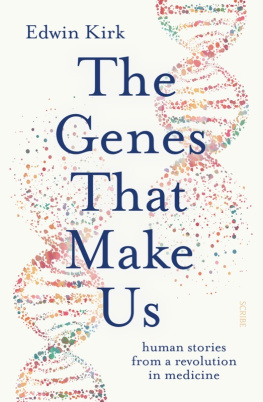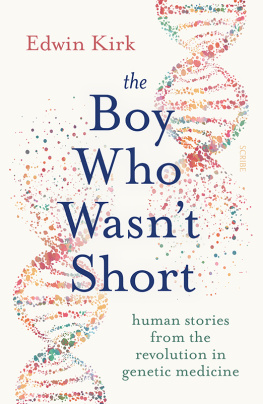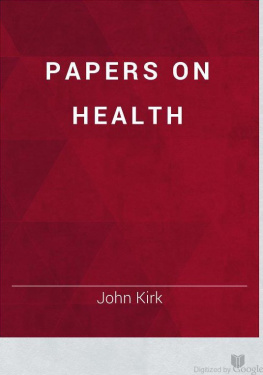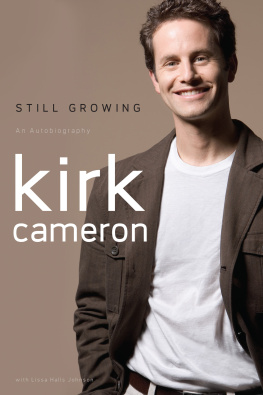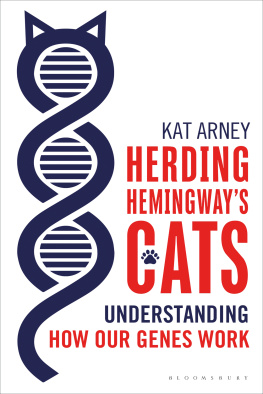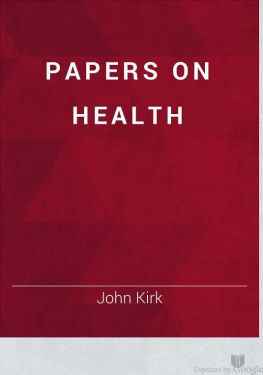Edwin Kirk - The Genes That Make Us
Here you can read online Edwin Kirk - The Genes That Make Us full text of the book (entire story) in english for free. Download pdf and epub, get meaning, cover and reviews about this ebook. year: 2020, publisher: Scribe Publications Pty Ltd, genre: Detective and thriller. Description of the work, (preface) as well as reviews are available. Best literature library LitArk.com created for fans of good reading and offers a wide selection of genres:
Romance novel
Science fiction
Adventure
Detective
Science
History
Home and family
Prose
Art
Politics
Computer
Non-fiction
Religion
Business
Children
Humor
Choose a favorite category and find really read worthwhile books. Enjoy immersion in the world of imagination, feel the emotions of the characters or learn something new for yourself, make an fascinating discovery.
- Book:The Genes That Make Us
- Author:
- Publisher:Scribe Publications Pty Ltd
- Genre:
- Year:2020
- Rating:3 / 5
- Favourites:Add to favourites
- Your mark:
- 60
- 1
- 2
- 3
- 4
- 5
The Genes That Make Us: summary, description and annotation
We offer to read an annotation, description, summary or preface (depends on what the author of the book "The Genes That Make Us" wrote himself). If you haven't found the necessary information about the book — write in the comments, we will try to find it.
The Genes That Make Us — read online for free the complete book (whole text) full work
Below is the text of the book, divided by pages. System saving the place of the last page read, allows you to conveniently read the book "The Genes That Make Us" online for free, without having to search again every time where you left off. Put a bookmark, and you can go to the page where you finished reading at any time.
Font size:
Interval:
Bookmark:

The Genes That Make Us
Professor Edwin Kirk is both a clinical geneticist and a genetic pathologist, a rare combination. As a clinician, he sees patients at Sydney Childrens Hospital, where he has worked for more than 20 years; his laboratory practice is in the New South Wales Health Pathology Genomics Laboratory at Randwick.
Kirk is a conjoint appointee in the School of Womens and Childrens Health at the University of New South Wales, an experienced medical educator, and currently Chief Examiner in Genetics for the Royal College of Pathologists of Australasia. He is also a respected researcher, working in the fields of cardiac genetics, metabolic diseases, and intellectual disability, as well as studying reproductive carrier screening, and is a co-author of more than 100 publications in scientific journals, which have been cited by other researchers more than 4,000 times. He is one of the co-leads and public faces of the $20 million Mackenzies Mission carrier screening project.
Kirk lives in Sydney with his wife and three children. In his spare time, he competes in ocean swimming races, slowly, and plays the saxophone, loudly.
Scribe Publications
1820 Edward St, Brunswick, Victoria 3056, Australia
2 John Street, Clerkenwell, London, WC1N 2ES, United Kingdom
First published by Scribe 2020
Copyright Edwin Kirk 2020
All rights reserved. Without limiting the rights under copyright reserved above, no part of this publication may be reproduced, stored in or introduced into a retrieval system, or transmitted, in any form or by any means (electronic, mechanical, photocopying, recording or otherwise) without the prior written permission of the publishers of this book.
The information in this book is general in nature and should not be considered to be personal medical advice. Readers are advised to contact their own doctors or other health professionals in relation to any medical concerns regarding their own or their childrens health, and should seek medical advice in relation to pregnancy-related issues, including screening and other tests during or before pregnancy.
9781925849394 (Australian edition)
9781912854363 (UK edition)
9781925938425 (ebook)
Catalogue records for this book are available from the National Library of Australia and the British Library.
scribepublications.com.au
scribepublications.co.uk
To my parents, Robin Enfield Kirk and Rosalie Saxby.
With much love and thanks, for nature and nurture.
Authors note
This book contains numerous descriptions of patients I have seen. In order to protect patient confidentiality, the descriptions have been extensively altered, sometimes by combining events that happened to several people. Consent has been provided as appropriate. Where the stories are based on real events, my intention is that it should be impossible to identify any particular individual from their descriptions here. An exception is that, if a patients story has previously been published in the medical literature, I have generally kept the key elements from the published version. I also tell the stories of some people who were not my patients, including Jesse Gelsinger and Mackenzie Casella. For both of the latter, extensive media coverage has already occurred. Mackenzies parents have read and approved the account of her life in chapter 11.
Contents
Preface:
Preface
An end, and a beginning
Genetics has taken me to some unexpected places. A basement stacked with hundreds of boxes of mice. A mosque in Pakistan, and another in the suburbs of Sydney. A ballroom filled with hundreds of people, every one of them seated in front of two small glasses of poison.
Mostly, though, theres nothing about the life of a geneticist that would strike a casual observer as exotic. Our days are filled with meetings and paperwork. We see patients in clinic rooms, or on the wards, like any doctor. Our labs have as much room devoted to generic-looking office space as they do to high-tech machinery. And even the high-tech machinery doesnt look like much. Theres an occasional device with futuristic flair, but much of our equipment sits squarely in the boring grey box school of industrial design.
Yet you shouldnt let yourself be fooled by outward appearances. Remarkable things are happening in genetics, a quiet revolution that has already dramatically changed some parts of medicine, and is coming for the rest. Within the next few years, having your genome sequenced will become routine. Theres a good chance youll have yours done one of these days, if you havent already. A decade or two from now, your family doctor will have your genetic information on file, as much a part of your record as your blood pressure, your weight, and the medications you take.
Theres a standard job-interview question: where do you see yourself in ten years from now? When this question gets asked of a clinical geneticist, the possibility often comes up that, in ten years from now, this will be a dying specialty not because genetics will become less important, but because it will be so important that every doctor will need to have mastery of the field, and nobody will need a doctor who just does genetics. Ive been hearing predictions like this for nearly a quarter of a century, but they have never seemed further from coming true than they are today. Instead, a handful of specialists neurologists particularly, but some cardiologists, endocrinologists, and others have embraced genetics, while most doctors have been way too busy with all the advances in their own fields to even try to keep up with ours. Meanwhile, our numbers have grown steadily, but from a tiny base, so that we are still relatively obscure. Even other doctors are often rather vague about what a geneticist does.
So what do we do? Unusually for medical specialists, our patients are not limited to one age group, or to people with problems affecting a particular organ. Sometimes, we are involved in peoples lives before they are even conceived; sometimes, when they are in the womb. We see babies, and children, and adults who are hoping to have children. We see grandparents because they have developed a genetic disorder late in life, or because a faulty gene is being tracked through a family to find people who are at risk. Sometimes, the first time a person has a genetic test is after they have died. My colleague David Mowat talks about the scope of our job being to provide care not just from womb to tomb, like a general practitioner, but from sperm to worm.
The thing that links all of our patients is, of course, genes and genetic disease in particular. The questions we try to answer are fundamental ones. How can we have a healthy baby? What caused my childs heart condition? Will I develop Huntington disease, like my father and his father?
In asking questions like these, people are letting us into their lives, often at times of strong emotions, often when there is loss and grief. Over my career so far, Ive been privileged to share part of the lives of thousands of people. Luckily for me, this time has also been an unprecedented period of growth in our understanding of genetics, a time of ever-accelerating discovery.
For me, it began in the mid-1990s. I was a junior doctor then, working in the intensive care unit of a childrens hospital in Sydney. One of my patients was a tiny baby, born with congenital heart disease, smaller than she should have been, and seemingly unwilling to breathe on her own. Machines were keeping her alive.
The results of genetic testing had come back, and a meeting was arranged so that one of the hospitals clinical geneticists could explain the result to the parents. Someone from the intensive care unit would usually sit in on such meetings, and so by chance it happened that I was there, witness as a young mother and father received the worst news of their lives.
Next pageFont size:
Interval:
Bookmark:
Similar books «The Genes That Make Us»
Look at similar books to The Genes That Make Us. We have selected literature similar in name and meaning in the hope of providing readers with more options to find new, interesting, not yet read works.
Discussion, reviews of the book The Genes That Make Us and just readers' own opinions. Leave your comments, write what you think about the work, its meaning or the main characters. Specify what exactly you liked and what you didn't like, and why you think so.

